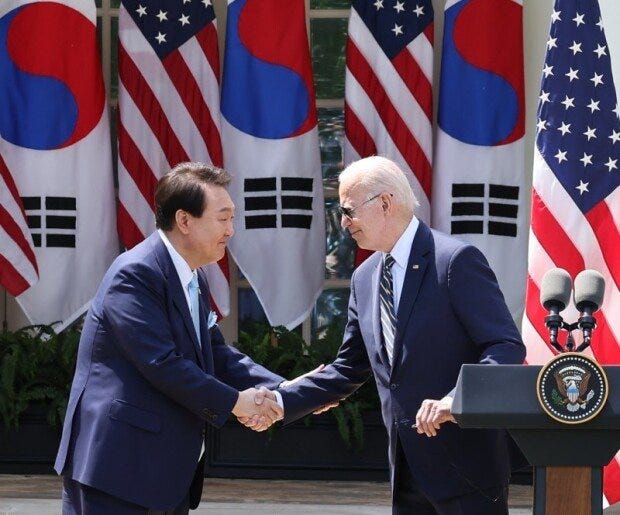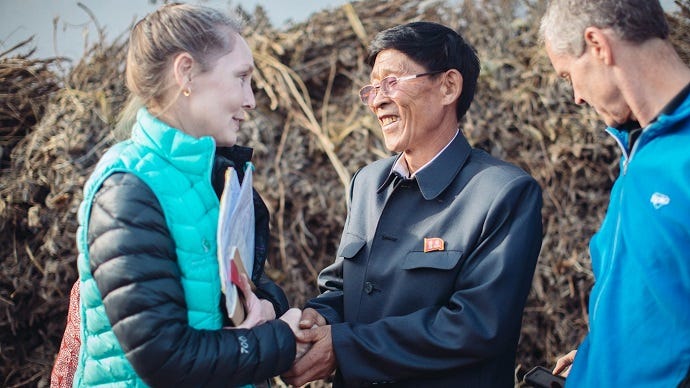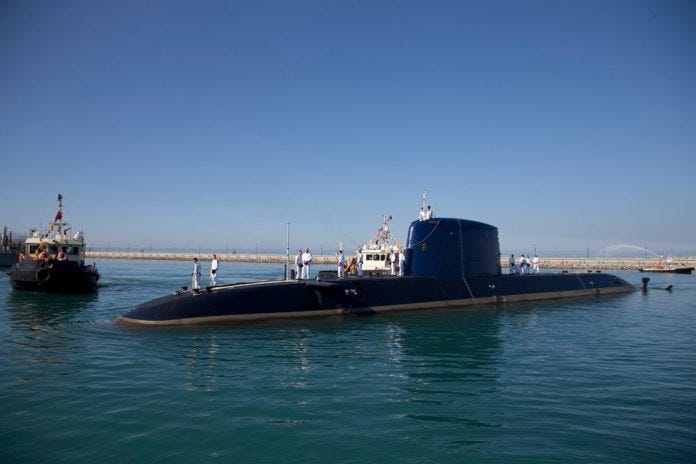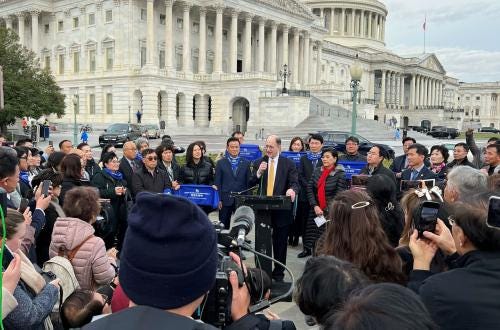U.S. Sends Nuclear Armed Submarines To South Korea. Now What?
Navigating The Delicate Balance Between Military Deterrence & Diplomatic Process, supporting peacemaking humanitarian groups has never been more dire.
While the Washington Declaration signed by U.S. President Joe Biden and South Korean President Yoon Suk-yeol seeks to strengthen, theoretically, nuclear deterrence coordination and offers assurance to South Korea under the U.S. nuclear umbrella, an essential approach to advancing peace on the Korean Peninsula that must be explored is through established religious and humanitarian organizations that have been building relationships with the people of North Korea for decades.
These organizations have been working on the ground in North Korea for years, offering aid, education, and medical assistance. By doing so, they have built a level of trust and understanding between the North Korean people and greater global community which is the foundation for diplomatic engagement and cooperation.
The cynic asks, “if humanitarian approaches work towards encouraging a closed country such as the DPRK to open up to the world, then why hasn’t it opened up to the world and embraced democracy yet?”
While the DPRK is not as open and accessible as most of the world’s countries, it has actually opened more up to outsiders over the past decade than ever since the cease-fire of the Korean War in 1953, Covid pandemic aside, by allowing companies and tourists from around the world to visit and conduct business operations there. These ventures have positive impacts.
Humanitarian organizations facilitate people-to-people interactions, which are crucial in conflict resolution. These interactions can lead to a better understanding of each other's cultures, values, and beliefs, ultimately fostering empathy and reducing hostility. Humanitarian aid provided by these organizations directly helps reduce the suffering of the North Korean people by addressing issues such as malnutrition and access to medical care. This assistance not only improves the quality of life for those in need but also builds goodwill between North Korea and the countries providing support to it.
Humanitarian organizations, mostly religious in nature in the sense of organizations driven by individuals compelled by a reverent faith in God, can serve as de facto neutral parties to encourage dialogue and cooperation between North Korea and other nations. This type of engagement, free from political or military pressure, may lead to more constructive and peaceful relations between the countries involved.
The work of humanitarian organizations on the Korean Peninsula highlights the fact that there are alternatives to military force for achieving peace and stability. By focusing on cooperation and aid, these organizations demonstrate that it is possible to make progress towards peace without resorting to military exhibitions of force.
Fostering peace on the Korean Peninsula through established humanitarian organizations that have decades of experience in building relationships with the people of North Korea presents a viable alternative to increasing military presence and shows of force. By promoting trust, understanding, and cooperation, these organizations play a vital role in creating a more peaceful and stable Korean Peninsula, Asia, and world at large.
The decision to send nuclear-armed submarines to South Korea for the first time in 40 years signals a significant shift in the United States' military presence in the region. While this move is intended to bolster deterrence and reassure South Korea, it may also have unintended consequences that could affect the stability of the Korean Peninsula and the region as a whole.
Escalation of tensions with North Korea, China and Russia
The deployment of nuclear-armed submarines in South Korea will naturally be interpreted by North Korea as a provocative and aggressive act. This could escalate tensions between the two Koreas and lead to an increase in North Korea's military activities further destabilizing the situation on the Korean Peninsula.
Additionally, the presence of U.S. nuclear-armed submarines in the region will likely be perceived as a threat also by China and Russia, which may see this move as an attempt to contain their influence in the area. This will naturally further strain relations between the United States and these countries, leading to diplomatic challenges and potentially increasing the risk of military confrontations in the region. The deployment of nuclear-armed submarines to South Korea might trigger an arms race in the region, with neighboring countries feeling compelled to increase their military capabilities in response to perceived threats.
Imagine how the United States might respond if China or Russia sent nuclear-armed submarines to Mexico.
This could result in an even more militarized and tense environment in East Asia, making it harder for nations to pursue diplomatic solutions to disputes.The presence of U.S. nuclear-armed submarines in South Korea will also undermine efforts to promote nuclear nonproliferation in the region. Other countries may view this move as evidence that nuclear weapons are necessary for their security, potentially leading to an increase in the number of states seeking to develop nuclear capabilities.
There is another option the United States must explore and advance, it is the peaceful approach found in Congressman Brad Sherman’s bipartisan bill also co-sponsored by Republican Congressman of Arizona, Andy Biggs, HR 1369 (The Peace on the Korean Peninsula Act).
Congressman Brad Sherman introduced the Peace on the Korean Peninsula Act (HR 1369) in the 118th Congress, which seeks to promote a peaceful resolution to the North Korean nuclear issue through diplomatic engagement and humanitarian assistance by calling for a formal end to the Korean War that has been in cease-fire status since 1953. This bill highlights the need for a balanced approach to security on the Korean Peninsula, incorporating both military deterrence and diplomatic efforts.
HR 1369 calls for direct diplomatic engagement with North Korea to address the nuclear issue and promote peace and security on the Korean Peninsula. By encouraging dialogue and negotiation, this bill aims to reduce tensions and create a foundation for long-term stability in the region.
Why should Americans care at all?
Approximately 100,000 Americans have relatives living in North Korea, this is one reason. HR 1369 could also enable diplomatic liaison offices to be established in North Korea, another positive step towards peace in the region.
The Peace on the Korean Peninsula Act emphasizes the importance of providing humanitarian assistance to the North Korean people, who have long suffered from food shortages, malnutrition, and inadequate healthcare. By supporting humanitarian efforts in North Korea, the United States can help build trust and goodwill between the two countries, paving the way worth exploring for further diplomatic progress.
The bill encourages the United States to work closely with its regional allies, including South Korea and Japan, to coordinate diplomatic efforts and promote a unified approach to the North Korean issue. This approach not only helps strengthen regional security but also sends a clear message to North Korea that the international community is united in its pursuit of peace and denuclearization on the Korean Peninsula, albeit a hindered process now with the U.S. sending nuclear-armed submarines to South Korea for the first time in 40 years.
As tensions rise due to the decision to send nuclear-armed submarines to South Korea it is important to consider the proven benefits of diplomatic efforts as outlined in the Peace on the Korean Peninsula Act (HR 1369). By engaging in direct diplomacy, providing humanitarian assistance, strengthening regional partnerships, and pursuing a phased approach to denuclearization, the United States can work toward achieving lasting peace and security on the Korean Peninsula.
Support peacemaking efforts on the Korean Peninsula because peace in the East means peace for the world!





